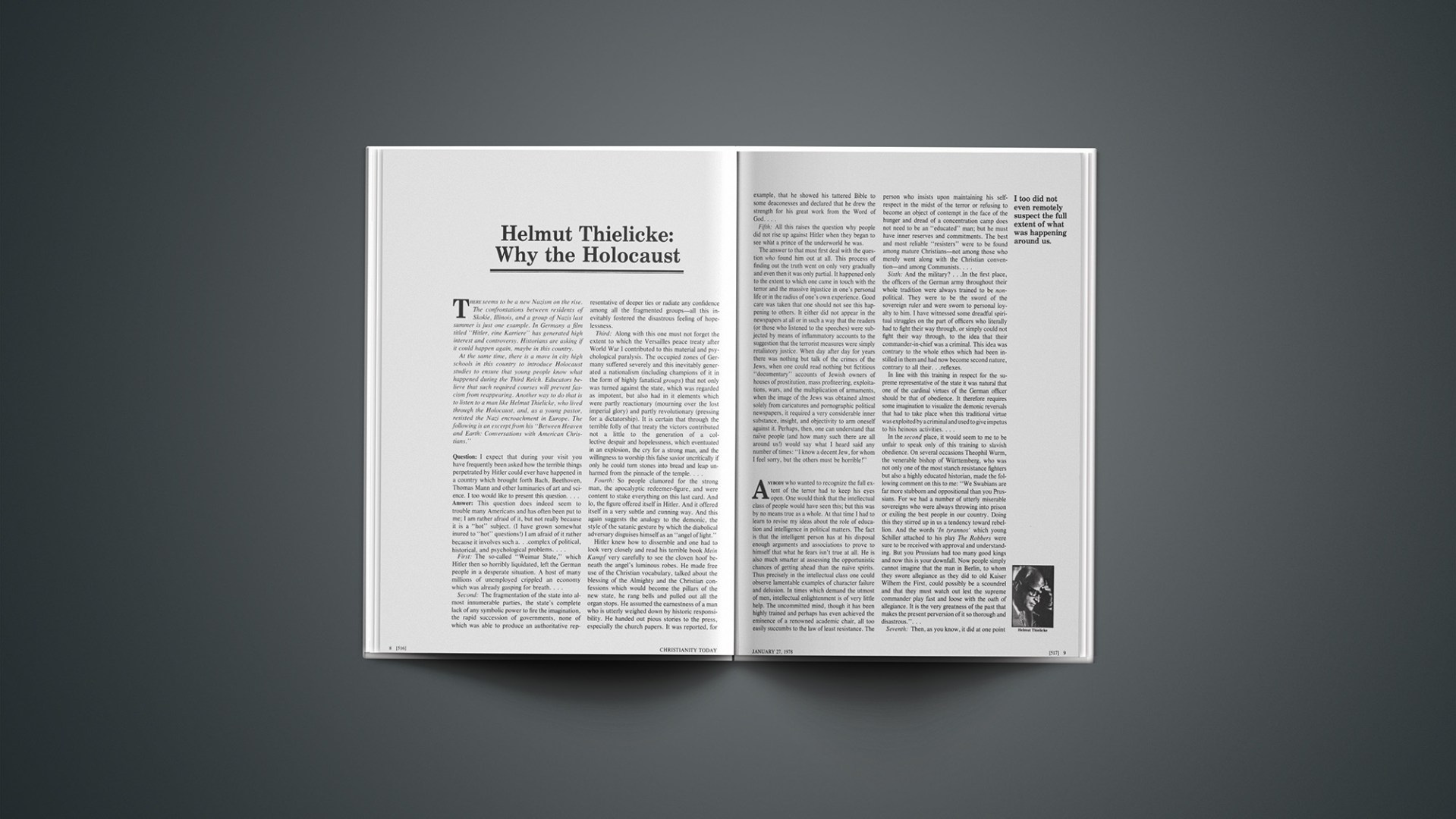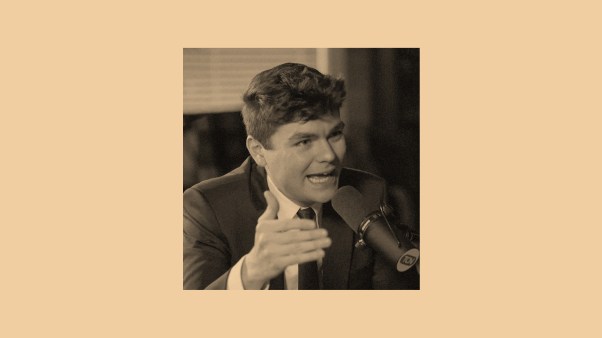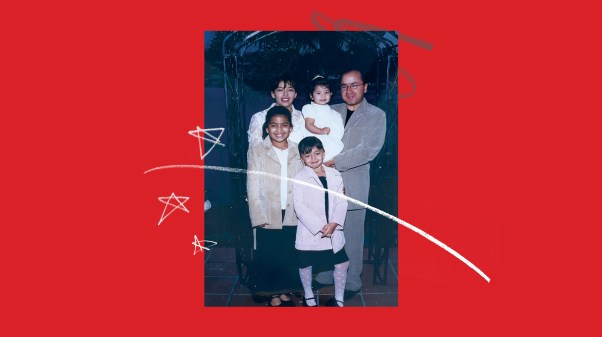A first-hand explanation.
There seems to be a new Nazism on the rise. The confrontations between residents of Skokie, Illinois, and a group of Nazis last summer is just one example. In Germany a film titled “Hitler, eine Karriere” has generated high interest and controversy. Historians are asking if it could happen again, maybe in this country.
At the same time, there is a move in city high schools in this country to introduce Holocaust studies to ensure that young people know what happened during the Third Reich. Educators believe that such required courses will prevent fascism from reappearing. Another way to do that is to listen to a man like Helmut Thielicke, who lived through the Holocaust, and, as a young pastor, resisted the Nazi encroachment in Europe. The following is an excerpt from his “Between Heaven and Earth: Conversations with American Christians.”
Question: I expect that during your visit you have frequently been asked how the terrible things perpetrated by Hitler could ever have happened in a country which brought forth Bach, Beethoven, Thomas Mann and other luminaries of art and science. I too would like to present this question.…
Answer: This question does indeed seem to trouble many Americans and has often been put to me; I am rather afraid of it, but not really because it is a “hot” subject. (I have grown somewhat inured to “hot” questions!) I am afraid of it rather because it involves such a.… complex of political, historical, and psychological problems.…
First: The so-called “Weimar State,” which Hitler then so horribly liquidated, left the German people in a desperate situation. A host of many millions of unemployed crippled an economy which was already gasping for breath.…
Second: The fragmentation of the state into almost innumerable parties, the state’s complete lack of any symbolic power to fire the imagination, the rapid succession of governments, none of which was able to produce an authoritative representative of deeper ties or radiate any confidence among all the fragmented groups—all this inevitably fostered the disastrous feeling of hopelessness.
Third: Along with this one must not forget the extent to which the Versailles peace treaty after World War I contributed to this material and psychological paralysis. The occupied zones of Germany suffered severely and this inevitably generated a nationalism (including champions of it in the form of highly fanatical groups) that not only was turned against the state, which was regarded as impotent, but also had in it elements which were partly reactionary (mourning over the lost imperial glory) and partly revolutionary (pressing for a dictatorship). It is certain that through the terrible folly of that treaty the victors contributed not a little to the generation of a collective despair and hopelessness, which eventuated in an explosion, the cry for a strong man, and the willingness to worship this false savior uncritically if only he could turn stones into bread and leap unharmed from the pinnacle of the temple.…
Fourth: So people clamored for the strong man, the apocalyptic redeemer-figure, and were content to stake everything on this last card. And lo, the figure offered itself in Hitler. And it offered itself in a very subtle and cunning way. And this again suggests the analogy to the demonic, the style of the Satanic gesture by which the diabolical adversary disguises himself as an “angel of light.”
Hitler knew how to dissemble and one had to look very closely and read his terrible book Mein Kampf very carefully to see the cloven hoof beneath the angel’s luminous robes. He made free use of the Christian vocabulary, talked about the blessing of the Almighty and the Christian confessions which would become the pillars of the new state, he rang bells and pulled out all the organ stops. He assumed the earnestness of a man who is utterly weighed down by historic responsibility. He handed out pious stories to the press, especially the church papers. It was reported, for example, that he showed his tattered Bible to some deaconesses and declared that he drew the strength for his great work from the Word of God
Fifth: All this raises the question why people did not rise up against Hitler when they began to see what a prince of the underworld he was.
The answer to that must first deal with the question who found him out at all. This process of finding out the truth went on only very gradually and even then it was only partial. It happened only to the extent to which one came in touch with the terror and the massive injustice in one’s personal life or in the radius of one’s own experience. Good care was taken that one should not see this happening to others. It either did not appear in the newspapers at all or in such a way that the readers (or those who listened to the speeches) were subjected by means of inflammatory accounts to the suggestion that the terrorist measures were simply retaliatory justice. When day after day for years there was nothing but talk of the crimes of the Jews, when one could read nothing but fictitious “documentary” accounts of Jewish owners of houses of prostitution, mass profiteering, exploitations, wars, and the multiplication of armaments, when the image of the Jews was obtained almost solely from caricatures and pornographic political newspapers, it required a very considerable inner substance, insight, and objectivity to arm oneself against it. Perhaps, then, one can understand that naïve people (and how many such there are all around us!) would say what I heard said any number of times: “I know a decent Jew, for whom I feel sorry, but the others must be horrible!”
Anybody who wanted to recognize the full extent of the terror had to keep his eyes open. One would think that the intellectual class of people would have seen this; but this was by no means true as a whole. At that time I had to learn to revise my ideas about the role of education and intelligence in political matters. The fact is that the intelligent person has at his disposal enough arguments and associations to prove to himself that what he fears isn’t true at all. He is also much smarter at assessing the opportunistic chances of getting ahead than the naïve spirits. Thus precisely in the intellectual class one could observe lamentable examples of character failure and delusion. In times which demand the utmost of men, intellectual enlightenment is of very little help. The uncommitted mind, though it has been highly trained and perhaps has even achieved the eminence of a renowned academic chair, all too easily succumbs to the law of least resistance. The person who insists upon maintaining his self-respect in the midst of the terror or refusing to become an object of contempt in the face of the hunger and dread of a concentration camp does not need to be an “educated” man; but he must have inner reserves and commitments. The best and most reliable “resisters” were to be found among mature Christians—not among those who merely went along with the Christian convention—and among Communists.…
Sixth: And the military?… In the first place, the officers of the German army throughout their whole tradition were always trained to be non-political. They were to be the sword of the sovereign ruler and were sworn to personal loyalty to him. I have witnessed some dreadful spiritual struggles on the part of officers who literally had to fight their way through, or simply could not fight their way through, to the idea that their commander-in-chief was a criminal. This idea was contrary to the whole ethos which had been instilled in them and had now become second nature, contrary to all their.… reflexes.
In line with this training in respect for the supreme representative of the state it was natural that one of the cardinal virtues of the German officer should be that of obedience. It therefore requires some imagination to visualize the demonic reversals that had to take place when this traditional virtue was exploited by a criminal and used to give impetus to his heinous activities.…
In the second place, it would seem to me to be unfair to speak only of this training to slavish obedience. On several occasions Theophil Wurm, the venerable bishop of Württemberg, who was not only one of the most stanch resistance fighters but also a highly educated historian, made the following comment on this to me: “We Swabians are far more stubborn and oppositional than you Prussians. For we had a number of utterly miserable sovereigns who were always throwing into prison or exiling the best people in our country. Doing this they stirred up in us a tendency toward rebellion. And the words ‘In tyrannos’ which young Schiller attached to his play The Robbers were sure to be received with approval and understanding. But you Prussians had too many good kings and now this is your downfall. Now people simply cannot imagine that the man in Berlin, to whom they swore allegiance as they did to old Kaiser Wilhem the First, could possibly be a scoundrel and that they must watch out lest the supreme commander play fast and loose with the oath of allegiance. It is the very greatness of the past that makes the present perversion of it so thorough and disastrous.”.…
Seventh: Then, as you know, it did at one point come to open rebellion—the bloodily suppressed attempt on July 20, 1944. Repeated references have been made—also in a very well-known American book—to the dilettante character of this venture which was doomed to failure. I regard this judgment itself as being very dilettante and almost intolerable, considering the sacrifices that it involved, of which I knew not a little. It only shows how little it is possible for those who live in the atmosphere of a free constitutional state to understand a resistance situation in a totalitarian country. I shall attempt by means of a very simplified example to show how hard it was to take forceful action under these circumstances.…
Now any one of you can see that (with or without an attempt on the life of the Führer) it would take at least a unit of troops, however small it might be (let us say, a company), in order to knock out the Führer’s headquarters. It would also take several other companies to occupy the various ministries, the radio stations, and other power centers. Let us assume that compact units numbering a total of a thousand men would have been needed. But even in an army of millions these one thousand men could not have been found; for every company was infested with so-called N. S. Führungsoffizieren (National Socialist Guidance Officers) and every company contained at least several sworn Nazis. They were therefore without exception unreliable for such measures. And, as it turned out, the whole thing was wrecked by the.… guidance officer of the small Berlin garrison company, who smelled a rat.…
Eighth: A great hindrance to the resistance was also the fact that the troops were sworn to personal allegiance to Hitler. How few saw through the form of this oath from the beginning! How few were moved to ponder the consequences that this might lead to! The fact is, of course, that very few had seen through Hitler himself. And could those who had some presentiment avoid taking the oath? And to be prepared ultimately to break the oath or to regard oneself as having been compelled to swear an oath contrary to conscience or to regard it as null and void in the face of Hitler’s gigantic perjury would have required a great deal of reflection which was left to the conscience of the solitary individual, since no one could speak about it openly or write a catechism on oaths. True, the church did say something, but it was so general that it took very little effort to miss it.…
Ninth: Nor can we overlook the indescribable fear of the indescribable terror. There is no such thing as mass heroism. This can be seen in the democracies too, though there the conditions that make it possible for a man to stand up for his rights are incomparably easier. But even the man who may have had some heroic impulses could very soon be gripped by cold horror.…
But despite all the important factors which I have mentioned I should be passing over the most important reason of all for this guilt and catastrophe if I did not make the following statement: It is my firm conviction that the ultimate reason why all this could have happened is theological in nature. It consists in the major premise of the anthropology upheld by the rulers and against which the German people manifestly possessed no inner defense. That may perhaps sound somewhat mysterious, and I will explain briefly what I mean.
There are two extremely different views of man. In one I evaluate man according to his functional worth, as a working power in the production process, as the bearer of erotic attractiveness (such as sex appeal) or of biological value (for example, in the sense given it by a doctrine of the master race). At bottom this view of man is pragmatic. In normal times its destructive features are sometimes veiled, or better, disguised. As long as a person functions as a valuable labor force he may be highly esteemed and perhaps honored as a “hero of labor.” Likewise his life moves on a high road, at least outwardly, as long as he functions erotically, that is, as long as he is young and attractive. And the same applies to his biological value in so far as he belongs to the “right” race and represents its supposed qualities.
This view of man which is determined by his functional value therefore contains a very definite pragmatic scale of values. This scale of values suggests the analogy of a machine. For a machine is likewise evaluated exclusively according to its functional value. If it is efficient and productive, it is, so to speak, “respected”; it is treasured and carefully serviced. When it is worn out and incapable of functioning it is scrapped. This analogy has some oppressing features when it is applied to the human parallel; for the high esteem which the efficiently functioning man enjoys in society is logically paralleled by his complete depreciation as soon as he loses his functional value. Then by a logical necessity the end result must be the concept of “life that is not worth being allowed to live.” And inherent in this concept is the.… consequence that “worthless life,” like a machine which no longer functions, must be scrapped. In this case the term used is “liquidate.”.…
As a representative of a country which has gone through these truly apocalyptic experiences, one can only lift up his voice in warning and say to his friends in this far more fortunate country: Take care that mere good manners, the simple slogan “Be nice to one another,” is not the ultimate determinant of your relationship to your fellow human beings. The very thing which Americans possess to such a large extent, this art of human relations, this ability to establish smooth and uncomplicated communication, can be suddenly paralyzed and turned into its opposite when we no longer know who and what man really is. Then all this “niceness” can become merely the expression of a pragmatic doctrine of optimal manners and etiquette. Then one is no longer “nice” because one has respect for human dignity, but rather because one desires merely for very practical reasons to eliminate as much as possible all friction from social intercourse and not allow any sand to get into the social machinery.…
The opposite view [of man] is the one we find in the gospel. Here the dignity of man rests not upon his functional ability, but rather upon the fact that God loves him, that he was dearly purchased, that Christ died for him, and that therefore he stands under the protection of God’s eternal goodness. And the mentally defective and those who are worthless in the eyes of men are also under this protection. Thus Bodelschwingh, the director of an institution for epileptics, could fling himself against the myrmidons of the SS and say: “You will take them away (for killing) only over my dead body.” He knew that even the most wretched of them, in whom our human eyes can scarcely see a spark of humanity, are loved by God—and no one dares to snatch them out of his hand. They have no immanent functional value, but they do have what Luther called man’s “alien dignity,” which means that they have a relationship, a history with God, and that the sacrifice of God hallows them and makes them sacrosanct. Only in this “alien dignity” is there any security. In any other case we are delivered over to human evaluation and manipulation.…
There is so much talk about the church’s responsibility for society. This often means that the church must take a position with regard to social, cultural, and political questions. I would by no means deny that this is part of its obligation. But prior to all secondary statements of its position is the primary task of the church to proclaim and to hold before the public consciousness this major premise, this fateful premise of anthropology, this central image of humanity which is set before our eyes in the gospel.
Let me conclude by trying once more to define this fundamental and really fateful thesis (looking back as I do so to the way in which this thesis became the key principle of the darkest chapter in the history of my country). What matters is not the utilization of man but rather the infinite value of the human soul. Any emphasis upon the utilization of man delivers us over to the disposition of human hands and therefore to the most frightful manipulations. But knowing the infinite value of the human soul allows us to be secure in the hands of God. We must decide whether we shall see in man an instrument of society or a child of God. We must decide whether we want to see him delivered over to men or to the protection of God’s eternal goodness.…
If a man’s value depends on his ability to function then like a machine that no longer works, we must be liquidated.
Question: Though you have shown us the background against which the disastrous development in Germany must be seen, I still cannot believe that these mass murders could have happened if the German people had known these things. I can understand that at the beginning there was no protest because the new rulers disguised their real intentions. But I cannot believe that if they had had a clear knowledge of what was happening, they would have tolerated the deportation and the gassing of millions of people. I have repeatedly been assured by German friends that they really knew nothing about this, and that when they learned of it after the war it was a horrible shock to them. Considering the magnitude of the crime, I cannot understand how it could have remained a secret.… So I ask you: Did the Germans know all this or not?
Answer: I could take the relatively easy way out and answer your question by saying that at any rate, of the people whom I know, not one knew the full extent of what happened. But naturally a great many must have caught some sound of the beating wings of darkness circling above us; rumors of what was happening were going around. But there was nothing to take hold of because the things themselves were done in secrecy and were also carefully concealed by the authorities. It was possible to dismiss all these rumors and to say to oneself: “I have no use for rumors” (which in normal times may be a perfectly honorable point of view). Moreover, many well-bred, decent people said to themselves: “This simply cannot be true; such infamy is beyond all imagination.” People said to themselves the very same thing that you have just said: “How could such a thing be possible at all in our country?” The daily propaganda kept drumming it into people’s heads that the “enemy stations” were broadcasting the most absurd lies in order to “break down our fighting strength.” And many attributed the rumors of atrocities to enemy psychological warfare the purpose of which was to break down morale. It is true that the star of David was to be seen in the streets. It would have taken some effort of imagination to visualize the misery of those who were compelled to wear it, but this people preferred not to do, for they were already sufficiently burdened with anxiety about the next night of bombing, with care for the future and for their husbands and sons at the front. I myself knew considerably more than most because I had access to something more than just everyday sources of information and because many of my friends were directly affected. Nor did I myself come off unscathed, and very early I learned to know some partial aspects of the bestiality of the rulers. But I too did not even remotely suspect the full extent of what was happening around us. And I do not consider it out of the question that I too would have thought it impossible if someone had told me about it before 1945. And after all, I was one who thought the Nazis were capable of some.… outrageous things.…
Why is it that despite all this I would not have a good conscience if I spoke only of the fact that the Germans did not know what was going on? Well, there are two different ways of not-knowing. One consists in the fact that one really has no information whatsoever and therefore cannot know anything. The other has its roots in the fact that one does not want to know something, that one is therefore repressing something which might possibly be known.…
I now appeal for a moment to your imagination. Think of a general who has come home for a brief furlough from the increasingly wavering front in the battlefields of the Soviet Union. The pressures and impressions of the hardships, the daily bloodshed, and the secret dread of the growing Soviet superiority of power are almost overwhelming him. And then you try to tell him something of the crimes of the regime at home and in the occupied countries. You try to tell him considerately that his commander-in-chief is a madman. Assume that he would not forthwith dismiss any thought of this kind because of his officer’s tradition and refuse to listen to such talk because of his oath of allegiance. Try to think of this general simply as a man, a man to whom the lives of thousands of men, a division, or an army are committed. How would he react to such news?
The dreadful responsibilities he must bear, the sacrifices of hardship and blood he must demand of his men—this can be borne only if he sees some meaning and purpose in it. And he can see meaning in it only if he is convinced that he is protecting the homeland from the Red flood and that the supreme representatives of his homeland—in whose service he stands—are worthy of that trust. If he came to the conviction that this war was not a defensive war at all, but that Hitler had started it in pursuit of his insane notions of world conquest, that Hitler himself was a prince of darkness and a madman, and that the homeland which he thought he was defending in Hitler’s name was actually being destroyed by his government, that therefore all the values which he was fighting for would go to the dogs anyhow—assuming that he came to this conviction, I ask you, how could he bear the burden of such knowledge? This would not only take away all meaning from his struggle and that of his men, it would not only reduce every sacrifice to horrible futility, but it would also confront him with some very definite consequences. Could he go on allowing himself to be used by this villain, could he go on serving him? Would not this mean that he was making himself a party to this gigantic work of destruction and murder?.…
I personally encountered many such conflicts, however, among those in the lower ranks, young officers and soldiers. Many of my students were officers. They fought on all the fronts, and on their furloughs they would come to me and ask, “What’s going on here at home? We have been hearing some things.” At first I always told them the plain truth, but then it cut my heart to have to let them go away in despair, having now to bear the inner burden of this knowledge on top of the burden of the battlefield. I can still hear the despairing cry of a young officer-theologian: “What then are we fighting for, if this fellow is destroying our church?” Another had tears in his eyes because he could not bear the thought that he was sworn to Hitler while his father was in prison as a Confessing pastor. Both of them were killed in battle. Only a few of my young students of that time ever returned. And I know that several of them sought death because they could not endure the contradiction. A young half-Jew, for example, one of the most faithful and gifted of them all, volunteered for every possible dangerous patrol duty. He knew far more than he could bear. And one day he did not have to come back.…
Question: Is it true that the collapse of Germany in 1945 brought about a religious revival? If so, has this revival continued? If not, why did it not come or why did it cease?…
Answer: After the collapse people in Germany went through a period of tremendous shock. When everything that had happened came out and countless people were suddenly and in very different ways led into a great silence (either into the troubled silence of the new situation under the occupation or the dreadful silence of the new concentration camps), the majority undoubtedly felt that a tremendous judgment had fallen upon us. Many people even spoke of the “blessing of the zero hour,” the time when things have hit absolute bottom and God gives the chance of a new beginning in the midst of the ruins and the dead.…
Externally this was apparent in the fact that the churches were crowded and that people literally cried out to the church for some word which would explain and point the way out of the situation. In this hour we also established the evangelical academies which sought on the basis of the gospel to point out roads to a new order and to a new self-understanding in the previously ideological country which had suddenly become a no man’s land. It appeared to be a precious and fruitful hour in our history. The soil of men’s hearts had been plowed and there was great readiness to repent. And there were times when I thought that now the hour of awakening might have come. Anybody who lived through these hours in the pulpit was moved by the way in which people listened.
And yet this hour, this kairos, passed by, people ate and drank, married and were given in marriage—and everything remained as it had always been. Why was this so?…
I believe, for example, that the church at that time did not find the message for the hour. There were some very unpleasant “seizures of power” and self-assertion on the part of the “old guard.” Not infrequently services were rewarded with offices and occasionally someone who really had exceptional charismatic gifts was made an ecclesiastical bureaucrat, where he naturally failed. Instead of the preaching of repentance and salvation we had the proclamation of a collective guilt and a hysteria of self-accusation which was in need of psychological understanding rather than having any theological justification, and this led to a hardening of men’s hearts. Despite the times, from many pulpits we heard only very conventional, pallid sermons which did not reach men’s hearts and left them cold. We seemed to be denied a prophetic awakening.
But from a totally different and altogether unexpected side there came something which in my judgment constituted an obstruction in the spiritual situation. When I speak here of the procedures of denazification as they were handled particularly by the Americans, I beg you to believe that today I can speak about this completely without anger. I have long since realized that a military government coming in from the outside simply could not understand certain things in an occupied country and that this was not changed by the fantastic amounts of printed information materials which the army carried with it. At that time (1947) I preached a sermon about and against these forms of denazification which was later published along with a polemical exchange of letters and also reprinted in American papers. It was precisely the reaction of American Christians to this that so happily showed me how innately helpful, fair, and self-critical people are in this country.…
Hitler made fine use of the Christian vocabulary.… He handed out pious stories to the press.
The Americans at first regarded the entire German people—with only a few exceptions—as one band of more or less thoroughgoing Nazis. Figuratively speaking they had the whole German people fall in three deep and then ordered everybody who had anything whatsoever to do with the Party to step to the left. They then added to this group a rather large number of other people. In Württemberg, for example, this included everybody who had a title that ended with “… rat,” such as Studienräte, Regierungsräte, Veternärräte (schoolmasters, government counselors, veterinarians). It was thought that these people must have had a specially close connection with the system. Many thousands were sent into concentration camps.…
The fact that very many were unjustly deprived of their positions and a good portion of them were imprisoned in itself led to a certain hardening of mind. Also contributing to this was perhaps the fact that many people had placed high hopes in liberation by the Americans, that they looked upon them as representatives of a Christian nation which would proceed in love and justice to show a nation of neopagans what true humanity is. In the face of such hopes any disillusionment would be sorely felt and would result in a loss of prestige for—a wrongly understood—Christianity.
But far worse than this and something which really brought with it what we have called a spiritual obstruction was the following. Innumerable people—I believe the greater part of the German people—were therefore dismissed from their jobs and professions. (At that time one could see formerly wealthy businessmen and high officials performing the manual labor of cleaning up the streets and rubble heaps.) In order to get back their positions and a livelihood, they had to undergo a process of denazification which required a testimonial. These testimonials were called Persilscheine (Persil was a well-known soap company which advertised that its soap would produce dazzling white laundry). The consequence was that everybody who was affected sat down and wrote letters to every possible irreproachable non-Nazi begging him to testify that he had had only a formal relationship to the Party, that he had really gone out of his way to protect the Jews, that he had always been cursing Hitler, and that he had just missed by a hair being sent to a Gestapo prison or concentration camp. And because the non-Nazis had sympathy for the many who were now being unjustly punished, they quite willingly handed out these Persilscheine (hopefully not too many to those who were really guilty!). Then these people could read some heart-moving words about their innocence, their heroism, their secret martyrdom. And all along we were all guilty and should have been arrested (if not by men then certainly by God). Many people had ten, twenty, and more such testimonials. Never in their lives had they seen such a flattering picture of themselves, since this is the kind of thing you read only in death notices and memorial addresses. When a man read this stuff he was able to recover his self-conceit!…
I say all this not in order to throw the blame on the Americans of that time. It is not my business here to draw up an account of guilt. I know what I did that was wrong. I too wrote Persilscheinen until my fingers were sore in order to save as many as possible whom I considered relatively harmless sinners. But should I not have enclosed a pastoral letter which would have said to the recipient: “We are all guilty and in need of the forgiveness which no appeal board can give us”? Should I not have written to him: “I seek to wash you clean before men, but what will happen to both of us when we stand before the Last Judgment and we are asked to give an account of the years past”? “It is our guilt that we are still living,” said Karl Jaspers. This may sound a bit overpathetic, but there is something to it.…
In closing I can only thank you for having shown such fraternal interest in the fortune of my country. We have not forgotten that it was the Christians—and especially the American Christians—who stretched out their hands to us after the war and provided us and our children with food and clothing. All of us who went through those years will treasure in our hearts this act of helping love.… There has been no need politely to retouch the picture or to beat about the bush. Nor does shame need to keep us from speaking. For we can take even the most painful things and set them down in the light of eternity in which we all stand together. We face one another not as strangers but as brothers. This is what I shall never forget about these hours.










